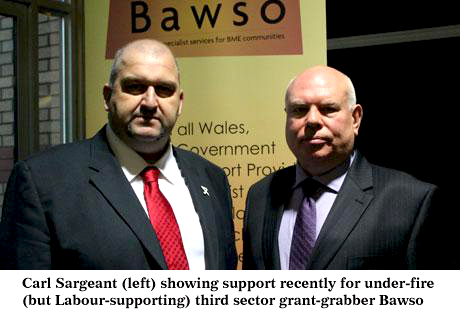I am grateful to Gruffydd Meredith of Cymru Sofren / Sovereign Wales
for providing the inspiration for this post.
The title of this post is obviously taken from the great baseball movie Field of Dreams. And even though the subject matter of this post is the ‘Welsh’ Government’s housebuilding programme to 2033, similar reasoning underpins both the storyline of the movie and the programme, as you’ll soon realise.
By now, anyone who takes an interest in Welsh affairs will be aware that someone, somewhere, has decided that between 2008 and 2033 the number of households in Wales will increase by 323,009. This figure, according to Carl Sargeant, ‘Welsh’ Government Minister for Housing and Regeneration, in a letter dated November 12th, 2013, is ” . . . based on a Welsh specific methodology which is separate to the methodology used in England”.
This projected increase accounts for the Local Development Plans (LDPs) that in recent years have been imposed on our local authorities; forcing them into planning for thousands of new houses they know are not needed by local people. Schemes adopted only because our councillors know in advance they’ll lose any appeal and will also be burdened with punitive legal costs. So do these projections stand up to scrutiny?
The first question to ask is, fair ly obviously, what is the size of a ‘household’? According to the ‘Welsh’ Government – and available here on the StatsWales website (or click on panel left) – it currently stands at 2.20 persons, but it is predicted to drop steadily until it reaches 2.02 persons per household in 2033.
ly obviously, what is the size of a ‘household’? According to the ‘Welsh’ Government – and available here on the StatsWales website (or click on panel left) – it currently stands at 2.20 persons, but it is predicted to drop steadily until it reaches 2.02 persons per household in 2033.
The figure of 323,009 over 25 years averages out at 12,920 new households per year. So multiplying the annual average of 12,920 new households by 2.2 gives us an increase in population for 2013 of 28,424, falling gradually until we reach 26,098 in 2033. Yet between the censuses of 2001 and 2011 Wales saw an average annual increase of just 15,300. Another curiosity is that according to these household projection figures, Wales should have seen an increase in population between 2008 and 2012 of roughly 114,000. Yet elsewhere on the StatsWales website we learn that the estimated population increase in that p eriod was only 48,200. (Click on panel right to enlarge.) Clearly, the figures for the projected increase in the number of households in Wales is, what statisticians call, a load of old bollocks.
eriod was only 48,200. (Click on panel right to enlarge.) Clearly, the figures for the projected increase in the number of households in Wales is, what statisticians call, a load of old bollocks.
So what is the justification in planning for an annual household / population increase of almost double that we have seen in the decade up to 2011, and more than double what we are experiencing today? Is Wales to enjoy an economic upsurge? Not with Labour running things. Are we to suddenly revert to having large numbers of children? Unlikely. And even if we were, this wouldn’t impact on the household figures until after 2033. Are we to become a nation of misogynist loners? We are already. The only explanation is that Wales is to see an influx of people from outside the country. And given that this is being planned for now, it will be an engineered influx.
These massive and unprecedented increases in population and household numbers can not come into play until the imposed LDPs are in operation. This explains why the household number projection from 2008 to the present is so woefully out of sync with the statistical realities. This also means that Wales is being told to build hundreds of thousands of new houses when those giving these instructions know in advance that the bulk of these new homes are designed solely to encourage English colonisation.
In areas of the north tens of thousands of new houses will be built for commuters moving out of Manchester, Merseyside and Cheshire, further weakening Welsh identity. In Carmarthenshire, so pivotal in recent political history, the Welsh language is to be reduced to curio status and the Welsh born marginalised. Powys is to become Outer Green Belt for the English West Midlands. For what we’re discussing here is not really about households and statistics, it’s about nationhood; our nationhood, and the continuing attempts to destroy it, and, by so doing, remove a political threat. This genocidal strategy is being implemented by the Planning Inspectorate, an English body – or, if you prefer, an Englandandwales body – that pretends it is in some way answerable to the ‘Welsh’ Government. It is not.
 The role of the English Planning Inspectorate has become ever clearer in recent years and this, inevitably, has resulted in growing criticism. Presumably in an attempt to prove its independence, the ‘Welsh’ Government has recently produced a Housing Bill, dealing mainly with social housing and private rented accommodation. This Bill is the social housing partner to the LDPs, for it confirms that when it comes to social housing in Wales everyone has priority over the Welsh. For example, in 85 pages it makes no mention of the Welsh language, yet contains half a dozen pages on ‘Gypsies and Travellers’. While I can’t directly blame them for this Bill, it certainly carries the fingerprints of another group of English civil servants pursuing an anti-Welsh agenda, this time the secretive Housing Directorate which, like the Planning Inspectorate, claims to be answerable to the ‘Welsh’ Government. A claim that is equally spurious.
The role of the English Planning Inspectorate has become ever clearer in recent years and this, inevitably, has resulted in growing criticism. Presumably in an attempt to prove its independence, the ‘Welsh’ Government has recently produced a Housing Bill, dealing mainly with social housing and private rented accommodation. This Bill is the social housing partner to the LDPs, for it confirms that when it comes to social housing in Wales everyone has priority over the Welsh. For example, in 85 pages it makes no mention of the Welsh language, yet contains half a dozen pages on ‘Gypsies and Travellers’. While I can’t directly blame them for this Bill, it certainly carries the fingerprints of another group of English civil servants pursuing an anti-Welsh agenda, this time the secretive Housing Directorate which, like the Planning Inspectorate, claims to be answerable to the ‘Welsh’ Government. A claim that is equally spurious.
By one of those coincidences that brings a wee shaft of brightness to these short days I yesterday received the latest Planning Inspectorate newsletter. Scroll down and you’ll see a piece headed, ‘Planning Reform in Wales’. (Note also that it mentions ‘Carl Sargeant the Welsh Minister . . . ‘ but neglects to give his portfolio!) Click on the link to the article or read below). I don’t know about you, but I find some of this chilling. “Joint planning boards would produce ‘sub regional’ type plans in those areas of the county (i.e. Wales) that require a more strategic approach than currently exists. Local Devolopment plans would remain but would be subject to refinement“. (My italics.) Which can only mean that the plans currently being forced on our local authorities can be changed. It goes on: “It is evident that further casework would be likely to come to the Planning Inspectorate, both in terms of dealing with applications for developments of national significance and other major developments”. Mmm. So here we are, discussing ‘Welsh’ legislation, yet it will result in more work for an English agency! Then we come to the final paragraphs, which I have reproduced in full. (Again, my italics.)
“In terms of appeals, many of the proposed reforms resonate with those introduced in England. e.g. submission of full statements of case with no opportunity thereafter to introduce argument/evidence.
The right to appear before an Inspector would be removed with the Inspectorate taking a more pro-active, case managing role in determining the appropriate format for appeals. Reflecting the Scottish system, appeals would be started as written representations with the Inspectorate escalating the format type as deemed necessary. This would include a hybrid format, similar to that used in Local Development Plan examinations, where the Inspector decides that most aspects could be dealt with via written representations, but certain aspects would require a hearing or inquiry format.
Again reflecting change in England, Inspectors would be able to in itiate cost awards against parties and to recover the costs in dealing with the appeal.
itiate cost awards against parties and to recover the costs in dealing with the appeal.
Third party rights of appeal have been ruled out following the evidence considered by the Independent Advisory Group and their recommendations.
Major changes are afoot.”
So, what have we learnt from this? First, that there people out there trying to destroy Welsh identity. Second, they don’t all live in England. Third, Wales, despite the posturing of Welsh politicians, with their silly gimmicks, is really controlled by shadowy civil servants answerable to even more shadowy agencies in London. Fourth, Wales is more closely integrated with England today than she was before ‘devolution’. Fifth, ‘devolution’ is an insulting sham.
But just in case I’m wrong I’ll give Sergeant a chance. You claim that the household projections for Wales up to 2033 are “based on a Welsh specific methodology which is separate to the methodology used in England”. The Planning Inspectorate suggests otherwise, welcoming the increasing uniformity of the planning systems operating in Wales and England. But just in case you’re right; it’s clear from the figures I’ve provided – or, rather, that the Office for National Statistics has provided – that those who supplied your figures for the increase in household numbers have made a mistake.
The population of Wales increased by an average of 15,300 a year between 2001 and 2011, and just 12,050 a year between 2008 and 2012, so how do you – or your ‘Welsh’ statisticians – explain a projected annual increase in population of almost 28,000 a year from now to 2033? If you cannot satisfactorily explain this projection, then you, and the Planning Inspectorate, have no alternative but to scrap Local Development Plans forced on Welsh local authorities to meet this unprecedented and unjustifiable increase.
P.S. Hope you enjoyed yourself at the Labour Christmas bash in Mischiefs Bar last night. (Heard you were DJ!) Also hope you were all spending your own money.

















